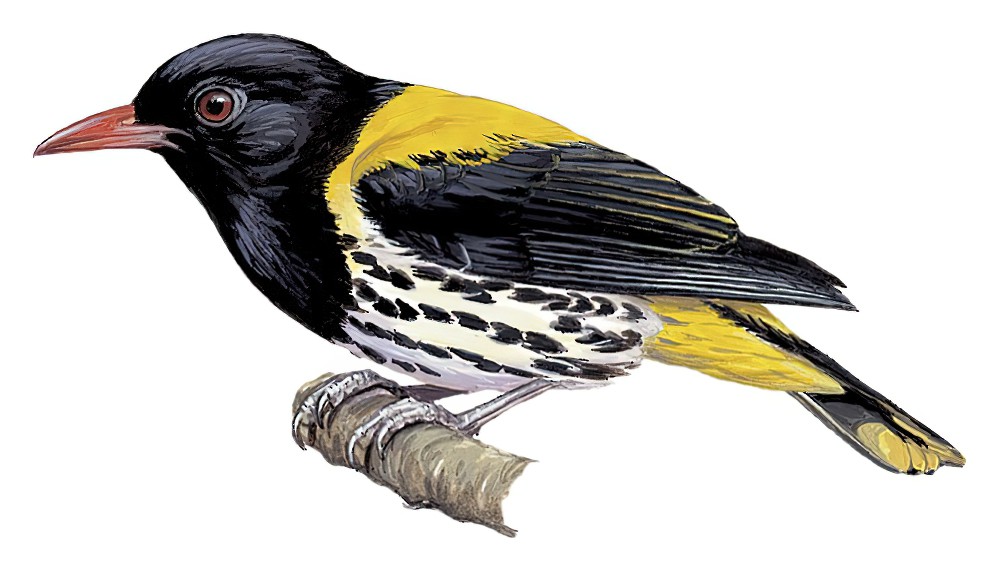Dark-throated Oriole / Oriolus xanthonotus

Dark-throated Oriole
SCI Name:
Protonym: Oriolus Xanthonotus Trans.Linn.Soc.London(1), 13 p.152
Taxonomy: Passeriformes / Oriolidae / Oriolus
Taxonomy Code: datori1
Type Locality: Java.
Author: Horsfield
Publish Year: 1821
IUCN Status: Near Threatened
DEFINITIONS
ORIOLUS
(Oriolidae; Ϯ Eurasian Golden Oriole O. oriolus) Med. L. oriolus Golden Oriole; this onomatopoeia echoes the melodic calls of the Eurasian Golden Oriole which are such a distinctive feature of European woodlands in the spring; "52. ORIOLUS. Rostrum conicum, convexum, acutissimum, rectum: mandibula superiore paulo longiore, obsolete emarginata. Lingua bifida, acuta. Pedes ambulatorii." (Linnaeus 1766): based on "Oriolus" and "Chlorion" of Gessner 1555, "Picus nidum suspendens" of Aldrovandus 1599-1603, "Galbula" of Willughby 1676, and Ray 1713, "Turdus luteus" of Frisch 1733-1743, "Coracias Oriolus" of Linnaeus 1746, and "Oriolus luteus" of Linnaeus 1750; "Oriolus Linnaeus, 1766, Syst. Nat., ed. 12, 1, p. 160. Type, by virtual tautonymy, Oriolus galbula Linnaeus = Coracias oriolus Linnaeus, 1758. ... Validation under the Plenary Powers of the generic name Oriolus Linnaeus, 1766, by the suppression of older homonym published by Brisson, 1760. Direction 21, Inter. Comm. Zool. Nomen., 1, Sec. C (C. 12): 161; 178, 1955." (Greenway in Peters 1962, XV, 122). Linnaeus's Oriolus comprised twenty species (O. Galbula, O. chinensis, O. melanocephalus, O. Icterus, O. phoeniceus, O. hæmorrhous, O. persicus, O. mexicanus (No. 8), O. guianensis, O. Baltimore, O. spurius, O. Bonana, O. mexicanus (No. 13), O. dominicensis, O. cayanensis, O. icterocephalus, O. melancholicus, O. capensis, O. aureus, O. chrysocephalus).
Var. Gridus, Oriotus, Orioblus, Eriolus.
Synon. Amimeta, Analcipus, Artamia, Baruffius, Broderipornis, Broderipus, Chloreus, Erythrolanius, Euchlorites, Mimeta, Mimetes, Neomimeta, Philocarpus, Psaropholus, Xanthonotus.
• (Icteridae; syn. Icterus † Venezuelan Troupial I. icterus) "GENUS 28. ORIOLUS Lin. Scopoli Lath. Dum. Icterus Briss. Cuv. La Cép. Xanthornus La Cép. (Gilbvogel Germ. Troupiale, Carouge Gall. Oriole Angl.) ... Species: Oriolus Icterus, Cayanensis Lin." (Illiger 1811); "Oriolus (not of Linnaeus, 1766) Illiger, Prodr. Syst. Mamm. Av., p. 214, 1811—type, by subs. desig. (Zimmer, Field Mus. Nat. Hist., Zool. Ser., 17, p. 435, 1930), Oriolus icterus Linnaeus." (Hellmayr, 1937, Cat. Birds Americas, Pt. X, p. 102).
oriolus
Med. L. oriolus and aureolus golden oriole, from its flute-like call (cf. L. aureolus golden < aurum gold).
● ex “Troupiale” of d’Aubenton 1765-1781, pl. 532 (syn. Icterus icterus).
● "49. CORACIAS. ... Oriolus. 3. C. flava alis caudaque nigris. Ampelis flava, artibus nigris, rectricibus quinque exterioribus restrorsum flavis. Act. Stockh. 1750. p. 127. t. 3. f. 5. Oriolus. Gesn. av. . . . Galbula. Aldr. orn. 854. t. 857. 858. Galbula benghalensis. Edw. av. 185. t. 185. Picus nidum suspendens. Will. orn. . . t. 36. f. 6. & t. 38. f. 4. Jonst. av. 112. t. 41. f. 8. Raj. av. 68. Flava avis benghalensis. Alb. av. 3. p. 19. t. 20. Habitat in Europa, Asia, migratoria avis." (Linnaeus 1758) (Oriolus).
xanthonotus
Gr. ξανθος xanthos yellow; -νωτος -nōtos -backed < νωτον nōton back.
Xanthonotus
(syn. Oriolus Ϯ Dark-throated Oriole O. xanthonotus) Specific name Oriolus xanthonotus Horsfield, 1821; "Ce cinquième genre est nommé par nous Xanthonotus, d'après son unique espèce, pour laquelle il faudra adopter comme nom spécifique celui de leucogaster, imposé par Reinwardt, par cet illustre professeur de l'Université de Leyde, qui vient d'être enlevé à la science" (Bonaparte 1854).
SUBSPECIES
Dark-throated Oriole (xanthonotus)
SCI Name: Oriolus xanthonotus xanthonotus
xanthonotus
Gr. ξανθος xanthos yellow; -νωτος -nōtos -backed < νωτον nōton back.
Dark-throated Oriole (consobrinus)
SCI Name: Oriolus xanthonotus consobrinus
consobrinus
L. consobrinus cousin < cum (old form com) together with; sobrinus male cousin on the mother's side < soror, sororis sister (originally of the children of two sisters).
● "This species is nearly allied to P. columbianus, Cab., [= subsp. Philydor rufum], and P. panerythrus, mihi [= subsp. Philydor rufum] ...This bird is also not unlike P. turdinus [= subsp. Automolus ochrolaemus] of Von Pelzeln" (P. Sclater 1870) (subsp. Cryptomolus rufipileatus).
● "With a general resemblance to Hylophylax naevia (Gmelin)" (Todd 1913) (subsp. Hylophylax naevius).
● "♀. Allied to Oriolus xanthonotus, but differs in having the head, sides of the face, and ear-coverts smoky cinereous" (Wardlaw Ramsay 1880) (subsp. Oriolus xanthonotus).
● "1. Thryothorus consobrinus n. sp. Diese neue Art steht dem Th. genibarbis Sw. am nächsten, von welchem sie in folgenden Merkmalen abweicht: Der Rücken ist lebhafter rostfarbig; die Grundfarbe des Schwanzes ist rostroth (bei Th. genibarbis bräunlich grau); die Kehle ist weiss, mit lehmgelbem Anflug; der Kropf, die Brust und der Bauch sind gelblich fahlbraun, an den Seiten mit dunkelgrauem Anflug." (von Madarász) (subsp. Pheugopedius mystacalis).
● "This race is somewhat intermediate between P. oregonus [= subsp. Pipilo maculatus] and P. carmani [= syn. Pipilo maculatus socorroensis], but seems to be most like the latter" (Ridgway 1876) (‡subsp. Pipilo maculatus).
● “I consider the discovery of this species most interesting, as affording a case analogous to that of Cyanopica, which appears restricted to Spain and Portugal in Europe and then turns up in China about the Yangtze and northwards, extending to Japan, in a somewhat modified form. The Penduline Tit occurs only in South Europe; and we find it again rather changed on the banks of the Yangtze 850 miles from the sea” (Swinhoe 1879) (Remiz).
● see consobrina
Dark-throated Oriole (mentawi)
SCI Name: Oriolus xanthonotus mentawi
mentawi
Mentawi Is., Dutch East Indies (= Indonesia).
Dark-throated Oriole (persuasus)
SCI Name: Oriolus xanthonotus persuasus
persuasus
L. persuasus fixed, settled < persuadere to convince.
UPPERCASE: current genus
Uppercase first letter: generic synonym
● and ● See: generic homonyms
lowercase: species and subspecies
●: early names, variants, mispellings
‡: extinct
†: type species
Gr.: ancient Greek
L.: Latin
<: derived from
syn: synonym of
/: separates historical and modern geographic names
ex: based on
TL: type locality
OD: original diagnosis (genus) or original description (species)












